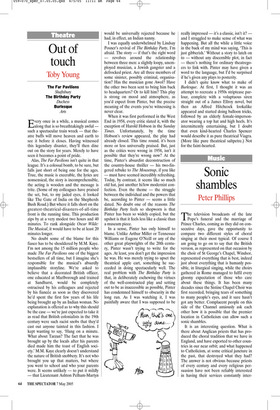Out of touch
Toby Young
The Far Pavilions Shaftsbury The Birthday Party Duchess Burlesque Arts
Every once in a while, a musical comes along that is so breathtakingly awful such a spectacular train wreck — that theatre buffs will move heaven and earth to see it before it closes. Having witnessed this legendary disaster, they’ll then dine out on the story for years. Merely to have seen it becomes a point of pride.
Alas, The Far Pavilions isn’t quite in that league. It’s a colossal bomb, to be sure, but falls just short of being one for the ages. True, the music is execrable, the lyrics are nonsensical, the story is incomprehensible, the acting is wooden and the message is trite. (Some of my colleagues have praised the set, but, to my jaded eyes, it looked like The Gate of India on the Shepherds Bush Road.) But where it falls short on the greatest-theatrical-disasters-of-all-time front is the running time. This production zips by at a very modest two hours and 40 minutes. To rank alongside Oscar Wilde: The Musical, it would have to be at least 20 minutes longer.
No doubt some of the blame for this fiasco has to be shouldered by M.M. Kaye. I’m not among the 15 million people who made The Far Pavilions one of the biggest bestsellers of all time, but I imagine she’s responsible for the musical’s absurdly implausible storyline. We’re asked to believe that a decorated British officer, one educated at Marlborough and trained at Sandhurst, would be completely ostracised by his colleagues and rejected by his fiancée as soon as they discovered he’d spent the first few years of his life being brought up by an Indian woman. No explanation is offered as to why this should be the case — we’re just expected to take it as read that British colonialists in the 19th century were such racist snobs that they’d cast out anyone tainted in this fashion. I kept wanting to say, ‘Hang on a minute. What about Tarzan? The fact that he was brought up by the locals after his parents died made him the toast of English society.’ M.M. Kaye clearly doesn’t understand the nature of British snobbery. It’s not who brought you up that matters, but where you went to school and who your parents were. It seems unlikely — to put it mildly — that Lieutenant Ashton Pelham-Martyn would be universally rejected because he had, in effect, an Indian nanny.
I was equally underwhelmed by Lindsay Posner’s revival of The Birthday Party, I’m afraid. The story — if that’s the right word — revolves around the relationship between three men: a slightly loopy, unemployed musician, a Jewish gangster and a defrocked priest. Are all three members of some sinister, possibly criminal, organisation? Has the musician gone Awol? Have the other two been sent to bring him back to headquarters? Or to kill him? This play is strong on mood and atmosphere, as you’d expect from Pinter, but the precise meaning of the events you’re witnessing is never clear.
When it was first performed in the West End in 1958, every critic slated it, with the exception of Harold Hobson in the Sunday Times. Unfortunately, by the time Hobson’s review appeared, the play had already closed. This time round, it’s been more or less universally praised. But, just as the critics were wrong in 1958, isn’t it possible that they’re wrong now? At the time, Pinter’s absurdist deconstruction of the country-house thriller — his two-fingered rebuke to The Mousetrap, if you like — must have seemed incredibly refreshing. Today, by contrast, it seems like so much old hat, just another hi/low modernist confection. Even the theme — the struggle between the individual and the powers that be, according to Pinter — seems a little dated. No doubt one of the reasons The Birthday Party feels so shopworn is that Pinter has been so widely copied, but the upshot is that it feels less like a classic than a museum piece.
In a sense, Pinter has only himself to blame. Unlike Arthur Miller or Tennessee Williams or Eugene O’Neill or any of the other great playwrights of the 20th century, Pinter wasn’t trying to write for the ages. At least, you don’t get the impression he was. He was merely trying to upset the theatrical apple cart, something he succeeded in doing spectacularly well. The real problem with The Birthday Party is that, in deliberately eschewing the virtues of the well-constructed play and setting out to be as inaccessible as possible, Pinter has condemned himself to obscurity in the long run. As I was watching it, I was painfully aware that I was supposed to be really impressed — it’s a classic, isn’t it? and I struggled to make sense of what was happening. But all the while a little voice in the back of my mind was saying, ‘This is just gibberish.’ Without a story to latch on to — without any discernible plot, in fact — there’s nothing for ordinary theatregoers to link with. Pinter may have given a word to the language, but I’d be surprised if he’s given any plays to posterity.
I didn’t quite know what to make of Burlesque. At first, I thought it was an attempt to recreate a 1950s striptease parlour, complete with a voluptuous siren straight out of a James Ellroy novel, but then an Alfred Hitchcock lookalike appeared and started doing balloon tricks, followed by an elderly female-impersonator wearing a top hat and high heels. It’s intermittently entertaining, but I doubt that even kind-hearted Charles Spencer would describe it as pure theatrical Viagra. (More like pure theatrical saltpetre.) Not for the faint-hearted.



























































 Previous page
Previous page